
Arrivals, inspections, victories.
In this volume are three works concerning the campaigns engaged in by the great Roman statesman Julius Caesar (100–44 BC), but not written by him. The Alexandrian War, which deals with troubles elsewhere also, may have been written by Aulus Hirtius (ca. 90–43 BC, friend and military subordinate of Caesar), who is generally regarded as the author of the last book of Caesar’s Gallic War. The African War and the Spanish War are detailed accounts clearly by officers who had shared in the campaigns. All three works are important sources of our knowledge of Caesar’s career.
The Loeb Classical Library edition of Caesar is in three volumes.
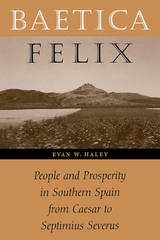
Baetica, the present-day region of Andalusia in southern Spain, was the wealthiest province of the Roman Empire. Its society was dynamic and marked by upward social and economic mobility, as the imperial peace allowed the emergence of a substantial middle social and economic stratum. Indeed, so mutually beneficial was the imposition of Roman rule on the local population of Baetica that it demands a new understanding of the relationship between Imperial Rome and its provinces.
Baetica Felix builds a new model of Roman-provincial relations through a socio-economic history of the province from Julius Caesar to the end of the second century A.D. Describing and analyzing the impact of Roman rule on a core province, Evan Haley addresses two broad questions: what effect did Roman rule have on patterns of settlement and production in Baetica, and how did it contribute to wealth generation and social mobility? His findings conclusively demonstrate that meeting the multiple demands of the Roman state created a substantial freeborn and ex-slave "middle stratum" of the population that outnumbered both the super-rich elite and the destitute poor.
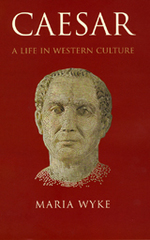
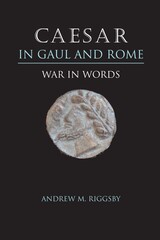
Winner, AAP/PSP Award for Excellence, Classics and Ancient History, 2006
Anyone who has even a passing acquaintance with Latin knows "Gallia est omnis divisa in partes tres" ("All Gaul is divided into three parts"), the opening line of De Bello Gallico, Julius Caesar's famous commentary on his campaigns against the Gauls in the 50s BC. But what did Caesar intend to accomplish by writing and publishing his commentaries, how did he go about it, and what potentially unforeseen consequences did his writing have? These are the questions that Andrew Riggsby pursues in this fresh interpretation of one of the masterworks of Latin prose.
Riggsby uses contemporary literary methods to examine the historical impact that the commentaries had on the Roman reading public. In the first part of his study, Riggsby considers how Caesar defined Roman identity and its relationship to non-Roman others. He shows how Caesar opens up a possible vision of the political future in which the distinction between Roman and non-Roman becomes less important because of their joint submission to a Caesar-like leader. In the second part, Riggsby analyzes Caesar's political self-fashioning and the potential effects of his writing and publishing the Gallic War. He reveals how Caesar presents himself as a subtly new kind of Roman general who deserves credit not only for his own virtues, but for those of his soldiers as well. Riggsby uses case studies of key topics (spatial representation, ethnography, virtus and technology, genre, and the just war), augmented by more synthetic discussions that bring in evidence from other Roman and Greek texts, to offer a broad picture of the themes of national identity and Caesar's self-presentation.

In 1912 a young scholar published a slim volume investigating the social structure of the late Roman Republic, which was in due course to transform the study of Roman history. The author, Mattias Gelzer, went on to hold the Chair of Ancient History at Frankfurt and to become the greatest German-speaking historian of the Roman Republic since Mommsen. In 1921 he published his Caesar, which has by now gone through six editions in Germany and is still the standard account, in any language, of Caesar and his age. It amply fulfills the author’s intent “to give the educated public a lively picture of the complete political career of one of the great statesmen of the past.”
Based on a conscientious evaluation of the abundant source materials—primarily the writings of Caesar and his contemporaries—Professor Gelzer’s portrait renders Caesar in heroic proportions, destined and determined from the beginning to overthrow a corrupt aristocracy. The sixth edition (1960), brought up to date and provided with full annotations by the author, is the basis of this translation, which for the first time makes the work available in English.
With Professor Gelzer’s approval, some minor errors have been corrected, both in the text and in the chronological table and the map at the end of the book, and an analytical index of names has been added.
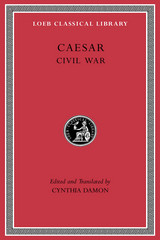
The struggle that ended the Roman Republic.
Caesar (C. Iulius, 102–44 BC), statesman and soldier, defied the dictator Sulla; served in the Mithridatic wars and in Spain; entered Roman politics as a “democrat” against the senatorial government; was the real leader of the coalition with Pompey and Crassus; conquered all Gaul for Rome; attacked Britain twice; was forced into civil war; became master of the Roman world; and achieved wide-reaching reforms until his murder. We have his books of commentarii (notes): eight on his wars in Gaul from 58–52 BC, including the two expeditions to Britain in 55–54, and three on the civil war of 49–48. They are records of his own campaigns (with occasional digressions) in vigorous, direct, clear, unemotional style and in the third person, the account of the civil war being somewhat more impassioned.
This edition of the Civil War replaces the earlier Loeb Classical Library edition by A. G. Peskett (1914) with new text, translation, introduction, and bibliography. In the Loeb Classical Library edition of Caesar, Volume I is his Gallic War; Volume III consists of Alexandrian War, African War, and Spanish War, commonly ascribed to Caesar by our manuscripts but of uncertain authorship.

Caesar (C. Iulius, 10244 BCE), statesman and soldier, defied the dictator Sulla; served in the Mithridatic wars and in Spain; pushed his way in Roman politics as a 'democrat' against the senatorial government; was the real leader of the coalition with Pompey and Crassus; conquered all Gaul for Rome; attacked Britain twice; was forced into civil war; became master of the Roman world; and achieved wide-reaching reforms until his murder. We have his books of Commentarii (notes): eight on his wars in Gaul, 5852 BC, including the two expeditions to Britain 5554, and three on the civil war of 4948. They are records of his own campaigns (with occasional digressions) in vigorous, direct, clear, unemotional style and in the third person, the account of the civil war being somewhat more impassioned.
The Loeb Classical Library edition of Caesar is in three volumes. Volume I is his Gallic War. The Alexandrian War, the African War and the Spanish War, commonly ascribed to Caesar by our manuscripts but of uncertain authorship, are collected in Volume III.

Chronicles of a Caesarean partisan.
Sallust, Gaius Sallustius Crispus (86–35 BC), a Sabine from Amiternum, acted as tribune against Cicero and Milo in 52, joined Caesar after being expelled from the Senate in 50, was restored to the Senate by Caesar and took part in his African campaign as praetor in 46, and was then appointed governor of New Africa (Numidia). Upon his return to Rome he narrowly escaped conviction for malfeasance in office, retired from public life, and took up historiography. Sallust’s last work, the annalistic Histories in five books, is much more expansive than his monographs on Catiline and Jugurtha (LCL 116), treating the whole of Roman history at home and abroad in the post-Sullan age. Although fragmentary, it provides invaluable information and insight about a crucial period of history spanning the period from 78 to around 67 BC.
Although Sallust is decidedly unsubtle and partisan in analyzing people and events, his works are important and significantly influenced later historians, notably Tacitus. Taking Thucydides as his model but building on Roman stylistic and rhetorical traditions, Sallust achieved a distinctive style, concentrated and arresting; lively characterizations, especially in the speeches; and skill at using particular episodes to illustrate large general themes.
For this volume, which completes the Loeb Classical Library edition of Sallust’s works, John T. Ramsey has freshly edited the Histories and the two pseudo-Sallustian Letters to Caesar, supplying ample annotation.

The conquest that begot the Roman Empire.
Caesar (C. Iulius, 102–44 BC), statesman and soldier, defied the dictator Sulla; served in the Mithridatic wars and in Spain; entered Roman politics as a “democrat” against the senatorial government; was the real leader of the coalition with Pompey and Crassus; conquered all Gaul for Rome; attacked Britain twice; was forced into civil war; became master of the Roman world; and achieved wide-reaching reforms until his murder. We have his books of commentarii (notes): eight on his wars in Gaul, 58–52 BC, including the two expeditions to Britain 55–54, and three on the civil war of 49–48. They are records of his own campaigns (with occasional digressions) in vigorous, direct, clear, unemotional style and in the third person, the account of the civil war being somewhat more impassioned.
The Loeb Classical Library edition of Caesar is in three volumes. Volume II is his Civil War. The Alexandrian War, the African War, and the Spanish War, commonly ascribed to Caesar by our manuscripts but of uncertain authorship, are collected in Volume III.
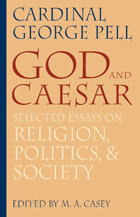

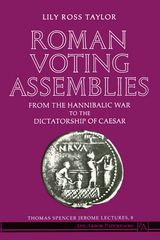
READERS
Browse our collection.
PUBLISHERS
See BiblioVault's publisher services.
STUDENT SERVICES
Files for college accessibility offices.
UChicago Accessibility Resources
home | accessibility | search | about | contact us
BiblioVault ® 2001 - 2024
The University of Chicago Press









